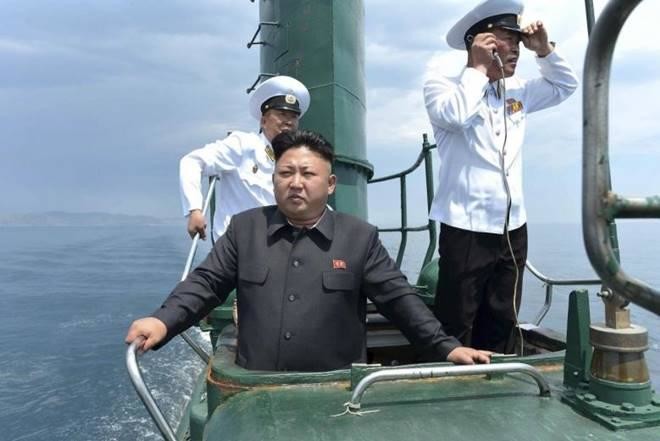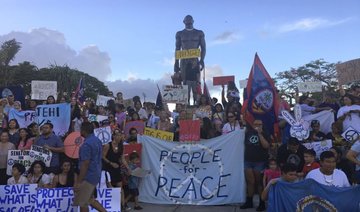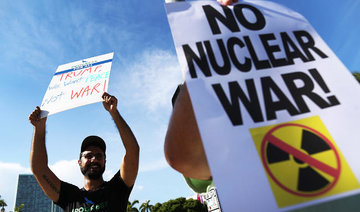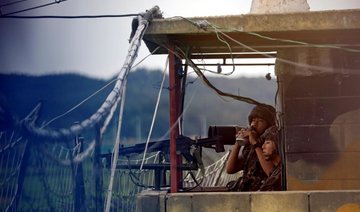SEOUL/WASHINGTON: North Korea’s leader has delayed a decision on firing missiles toward Guam while he waits to see what the United States does next, the North’s state media said on Tuesday, as South Korea’s president said Seoul would seek to prevent war by all means.
Signs of an easing in tension on the Korean peninsula helped stock markets rally for a second day running even as the United States and South Korea prepared for more joint military drills and experts warned North Korea could still go ahead with its provocative plan.
In his first public appearance in about two weeks, North Korean leader Kim Jong Un inspected the command of the North’s army on Monday, examining a plan to fire four missiles to land near the US Pacific territory of Guam, the official KCNA said in a report.
“He said that if the Yankees persist in their extremely dangerous reckless actions on the Korean peninsula and in its vicinity, testing the self-restraint of the DPRK, the latter will make an important decision as it already declared,” the report said.
The DPRK stands for North Korea’s official name, the Democratic People’s Republic of Korea.
In photos released with the KCNA report, Kim was seen holding a baton and pointing at a map showing a flight path for the missiles appearing to start from North Korea’s east coast, flying over Japan toward Guam. North Korea has often threatened to attack the United States and its bases and released similar photos in the past but never followed through.
Pyongyang’s plans to fire missiles near Guam prompted a surge in tensions in the region last week, with US President Donald Trump saying the US military was “locked and loaded” if North Korea acted unwisely.
South Korean President Moon Jae-in said on Tuesday there would be no military action without Seoul’s consent and his government would prevent war by all means.
“Military action on the Korean peninsula can only be decided by South Korea and no one else can decide to take military action without the consent of South Korea,” Moon said in a speech to commemorate the anniversary of the nation’s liberation from Japanese military rule in 1945.
“The government, putting everything on the line, will block war by all means,” Moon said.
NUCLEAR DETERRENT
Japan will be seeking further reassurance from Washington in meetings between Japan’s defense chief and foreign minister and their US counterparts on Thursday.
“The strategic environment is becoming harsher and we need to discuss how we will respond to that,” a Japanese foreign ministry official said in a briefing in Tokyo.
“We will look for the US to reaffirm it defense commitment, including the nuclear deterrent.”
The Liberation Day holiday, celebrated by both North and South, will be followed next week by joint US-South Korean military drills sure to anger Pyongyang.
North Korea has persisted with its nuclear and missile programs, to ward off perceived US hostility, in defiance of UN Security Council resolutions and sanctions.
China, North Korea’s main ally and trading partner, has repeatedly urged Pyongyang to halt its weapons program and at the same time urged South Korea and the United States to stop military drills to lower tensions. On Tuesday, it urged all sides in the standoff to help “put out the fire” and not add to the flames.
China’s state-run Global Times said Seoul should play a buffer between the United States and North Korea to prevent a head-on confrontation.
“The drill will definitely provoke Pyongyang more, and Pyongyang is expected to make a more radical response,” the paper said in an editorial. “If South Korea really wants no war on the Korean peninsula, it should try to stop this military exercise.”
Asian shares rose for a second day on Tuesday and the dollar firmed after Kim’s comments further eased tension and prompted investors to move back into riskier assets after a sharp selloff last week.
Kim Dong-yub, a professor and a military expert at Kyungnam University’s Institute of Far Eastern Studies in Seoul, urged caution in assuming North Korea was bluffing with its missile threats.
“There is no stepping back for North Korea. Those who don’t know the North very well fall into this trap every time (thinking they are easing threats) but we’ve seen this before.”
“TAKE IT OUT“
The United States and South Korea remain technically still at war with North Korea after the 1950-53 Korean conflict ended with a truce, not a peace treaty.
North Korea is currently holding three US citizens it accuses of espionage or hostile acts but now was not the right time to discuss them, KCNA cited a foreign ministry spokesman as saying in a separate report.
Pyongyang has in the past used detainees to extract concessions, including high-profile visits from the United States, which has no formal diplomatic relations with North Korea.
US officials have in recent days played down the risk of an imminent conflict while stressing their preparedness to respond militarily to any attack from North Korea.
Defense Secretary Jim Mattis said on Monday the US military would know the trajectory of a missile fired from North Korea within moments and would “take it out” if it looked like it would hit the US Pacific territory.
“The bottom line is, we will defend the country from an attack; for us (US military) that is war,” Mattis said.
On Guam, home to a US air base, a Navy installation, a Coast Guard group and roughly 6,000 US military personnel, residents expressed some relief at the lessening of tensions.
“I’m reading between the lines that I don’t see an imminent threat,” Guam Lt. Governor Ray Tenorio told a media briefing in the island’s capital of Hagatna.
Japanese Prime Minister Shinzo Abe praised a commitment by Trump that the United States would stand with its allies in the region to counter threats from North Korea.
In a telephone call on Tuesday, Abe also agreed with Trump that their top priority was to do what they could to halt missile launches by the North.
N.Korea’s Kim holds off on Guam missile plan; Seoul says will prevent war
N.Korea’s Kim holds off on Guam missile plan; Seoul says will prevent war

UK Supreme Court to rule on landmark legal challenge over legal definition of a woman

- Britain’s highest court scheduled to rule whether a transgender person with a certificate that recognizes them as female can be regarded as a woman under equality laws
Five judges at Britain’s highest court are scheduled to rule whether a transgender person with a certificate that recognizes them as female can be regarded as a woman under equality laws.
While the case centers on Scottish law, the group bringing the challenge, For Women Scotland (FWS), has said its outcomes could have UK-wide consequences for sex-based rights as well as everyday single-sex services such as toilets and hospital wards.
What’s the case about?
The case stems from a 2018 law passed by the Scottish Parliament stating that there should be a 50 percent female representation on the boards of Scottish public bodies. That law included transgender women in its definition of women.
The women’s rights group successfully challenged that law, arguing that its redefinition of “woman” went beyond parliament’s powers.
Scottish officials then issued guidance stating that the definition of “woman” included a transgender woman with a gender recognition certificate.
FWS sought to overturn that.
“Not tying the definition of sex to its ordinary meaning means that public boards could conceivably comprise of 50 percent men, and 50 percent men with certificates, yet still lawfully meet the targets for female representation,” the group’s director Trina Budge said.
The challenge was rejected by a court in 2022, but the group was granted permission last year to take its case to the Supreme Court.
What are the arguments?
Aidan O’Neill, a lawyer for FWS, told the Supreme Court judges – three men and two women – that under the Equality Act “sex” should refer to biological sex and as understood “in ordinary, everyday language.”
“Our position is your sex, whether you are a man or a woman or a girl or a boy is determined from conception in utero, even before one’s birth, by one’s body,” he said on Tuesday. “It is an expression of one’s bodily reality. It is an immutable biological state.”
The women’s rights group counts among its supporters author J.K. Rowling, who reportedly donated tens of thousands of pounds to back its work. The “Harry Potter” writer has been vocal in arguing that the rights for trans women should not come at the expense of those who are born biologically female.
Opponents, including Amnesty International, said excluding transgender people from sex discrimination protections conflicts with human rights.
Amnesty submitted a brief in court saying it was concerned about the deterioration of the rights for trans people in the UK and abroad.
“A blanket policy of barring trans women from single-sex services is not a proportionate means to achieve a legitimate aim,” the human rights group said.
Canadian university teachers warned against traveling to the United States

- The Canadian government recently updated its US travel advisory, warning residents they may face scrutiny from border guards and the possibility of detention if denied entry
HALIFAX, Nova Scotia: The association that represents academic staff at Canadian universities is warning its members against non-essential travel to the United States.
The Canadian Association of University Teachers released updated travel advice Tuesday due to the “political landscape” created by President Donald Trump’s administration and reports of some Canadians encountering difficulties crossing the border.
The association says academics who are from countries that have tense diplomatic relations with the United States, or who have themselves expressed negative views about the Trump administration, should be particularly cautious about US travel.
Its warning is particularly targeted to academics who identify as transgender or “whose research could be seen as being at odds with the position of the current US administration.”
In addition, the association says academics should carefully consider what information they have, or need to have, on their electronic devices when crossing the border, and take actions to protect sensitive information.
Reports of foreigners being sent to detention or processing centers for more than seven days, including Canadian Jasmine Mooney, a pair of German tourists, and a backpacker from Wales, have been making headlines since Trump took office in January.
The Canadian government recently updated its US travel advisory, warning residents they may face scrutiny from border guards and the possibility of detention if denied entry.
Crossings from Canada into the United States dropped by about 32 percent, or by 864,000 travelers, in March compared to the same month a year ago, according to data from US Customs and Border Protection. Many Canadians are furious about Trump’s annexation threats and trade war but also worried about entering the US
David Robinson, executive director of the university teachers association, said that the warning is the first time his group has advised against non-essential US travel in the 11 years he’s worked with them.
“It’s clear there’s been heightened scrutiny of people entering the United States, and … a heightened kind of political screening of people entering the country,” said Robinson, whose association represents 70,000 teachers, librarians, researchers, general staff and other academic professionals at 122 universities and colleges.
Robinson said the group made the decision after taking legal advice in recent weeks. He said lawyers told them that US border searches can compromise confidential information obtained by academics during their research.
He said the association will keep the warning in place until it sees “the end of political screening, and there is more respect for confidential information on electronic devices.”
Afghan children will die because of US funding cuts, aid official says

- More than 3.5 million children in Afghanistan will suffer from acute malnutrition this year, an increase of 20 percent from 2024
Afghan children will die because of US funding cuts, an aid agency official said Tuesday.
The warning follows the cancelation of foreign aid contracts by President Donald Trump’s administration, including to Afghanistan where more than half of the population needs humanitarian assistance to survive.
Action Against Hunger initially stopped all US-funded activities in March after the money dried up suddenly. But it kept the most critical services going in northeastern Badakhshan province and the capital Kabul through its own budget, a measure that stopped this month.
Its therapeutic feeding unit in Kabul is empty and closing this week. There are no patients, and staff contracts are ending because of the US funding cuts.
“If we don’t treat children with acute malnutrition there is a very high risk of (them) dying,” Action Against Hunger’s country director, Cobi Rietveld, told The Associated Press. “No child should die because of malnutrition. If we don’t fight hunger, people will die of hunger. If they don’t get medical care, there is a high risk of dying. They don’t get medical care, they die.”
More than 3.5 million children in Afghanistan will suffer from acute malnutrition this year, an increase of 20 percent from 2024. Decades of conflict — including the 20-year US war with the Taliban — as well as entrenched poverty and climate shocks have contributed to the country’s humanitarian crisis.
Last year, the United States provided 43 percent of all international humanitarian funding to Afghanistan.
Rietveld said there were other nongovernmental organizations dealing with funding cuts to Afghanistan. “So when we cut the funding, there will be more children who are going to die of malnutrition.”
The children who came to the feeding unit often could not walk or even crawl. Sometimes they were unable to eat because they didn’t have the energy. All the services were provided free of charge, including three meals a day.
Rietveld said children would need to be referred to other places, where there was less capacity and technical knowledge.
Dr. Abdul Hamid Salehi said Afghan mothers were facing a crisis. Poverty levels among families meant it was impossible to treat severely malnourished children in private clinics.
“People used to come to us in large numbers, and they are still hoping and waiting for this funding to be found again or for someone to sponsor us so that we can resume our work and start serving patients once more.”
Magnitude 5.6 earthquake strikes Hindu Kush region, Afghanistan, EMSC says

- EMSC first reported the quake at a magnitude of 6.4
KABUL: An earthquake of magnitude 5.6 struck the Hindu Kush region in Afghanistan on Wednesday, the European-Mediterranean Seismological Center (EMSC) said.
The quake was at a depth of 121 km (75 miles), EMSC said, and the epicenter 164 km east of Baghlan, a city with a population of about 108,000.
EMSC first reported the quake at a magnitude of 6.4.
US plans to use tariff negotiations to isolate China, WSJ reports

- US officials plan to use negotiations with more than 70 nations to ask them to disallow China to ship goods through their countries and prevent Chinese firms from being located in their territories to avoid US tariffs
WASHINGTON: US President Donald Trump administration plans to use ongoing tariff negotiations to pressure US trading partners to limit their dealings with China, The Wall Street Journal reported on Tuesday citing people with knowledge of the conversations.
US officials plan to use negotiations with more than 70 nations to ask them to disallow China to ship goods through their countries and prevent Chinese firms from being located in their territories to avoid US tariffs, the report added.




















